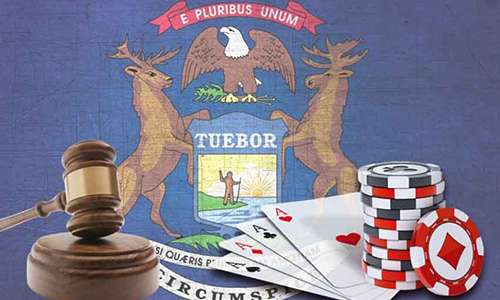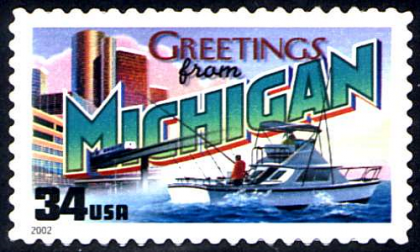Michigan Becomes Sixth US State to Legalize Online Poker
And then there were six. After a flurry of legislative negotiations following several failures of similar legislation in earlier years, Michigan has become the sixth US state to legalize and regulate online poker. The signing of the legalization measure on Friday by Michigan Governor Gretchen Whitmer followed the passage of a compromise measure by Michigan’s House and Senate, both of which approved the measure by large majorities.
Though our focus is on the online-poker aspect of the bill, the larger mainstream aspect is that the online-poker legalization is just one tiny portion of a widespread gambling expansion for the Wolverine State. The true driving force for the expansion in Michigan was the legalization of sports betting, with online poker and other forms of online gambling coming along for a welcome ride.
 “With Gov. Whitmer’s signature, twenty states plus DC have now legalized sports betting in the United States, capping off a tremendous year of growth,” said Bill Miller, president and CEO of the American Gaming Association. “These new markets offer more Americans a safe, legal way to wager on sports while positively impacting communities, like in Michigan, where revenue from sports betting will generate needed resources for public education, first responders, and, importantly, responsible gaming.” Not only online poker, but all of online gambling as approved by Michigan was sold a bit short there by Miller, who like his AGA predecessors remains largely funded by online-gambling pariah Sheldon Adelson, and thus took care not to rub more salt in Adelson’s Michigan-shaped wound.
“With Gov. Whitmer’s signature, twenty states plus DC have now legalized sports betting in the United States, capping off a tremendous year of growth,” said Bill Miller, president and CEO of the American Gaming Association. “These new markets offer more Americans a safe, legal way to wager on sports while positively impacting communities, like in Michigan, where revenue from sports betting will generate needed resources for public education, first responders, and, importantly, responsible gaming.” Not only online poker, but all of online gambling as approved by Michigan was sold a bit short there by Miller, who like his AGA predecessors remains largely funded by online-gambling pariah Sheldon Adelson, and thus took care not to rub more salt in Adelson’s Michigan-shaped wound.
In 2018, a somewhat similar bill made it all the way to the desk of then-Governor Rick Snyder, but Snyder vetoed that measure. When Whitmer took office, Michigan’s legislative supporters of the gambling measure Snyder vetoed first tried to resurrect the same bill, but received word from Whitmer’s administration that she, too, had concerns over some of the earlier bill’s provisions. That led to the bill’s primary sponsors, including MI State Rep. Brandt Iden, spending most of 2019 hammering out new provisions that were palatable to concerned voting groups while still being acceptable to the waiting commercial stakeholders.
It’ll be some time before Michigan’s online-poker framework is put into place. Even the setting of a live date for Michigan online poker is a long way off, though it’s expected that the first sites will come online at some point in 2020.
Eligibility for online-poker and online-gambling operating licenses is limited to Michigan’s 26 existing land-based casinos. The state has three commercial casinos near Detroit and 23 tribal casinos spread across the rest of the state. Not all of these casinos offer live poker — in fact, most of them don’t — but all will be eligible to apply to provide an online version.
Other known specifics are that each casino will be limited to one online poker brand and one online casino brand. These brands, or sites, may share a high degree of commonality or could be launched as distinct entities. The race to sign third-party software partners really hasn’t begun in a public sense, but it’s a safe bet that some deals will be announced soon.
The US online-poker spigot is open again, though only set for a slow drip. Michigan’s addition to the legalized list is a very good thing, but the real growth spurt for the US will come when multi-state player pooling opportunities are fully realized.




















COMMENTS